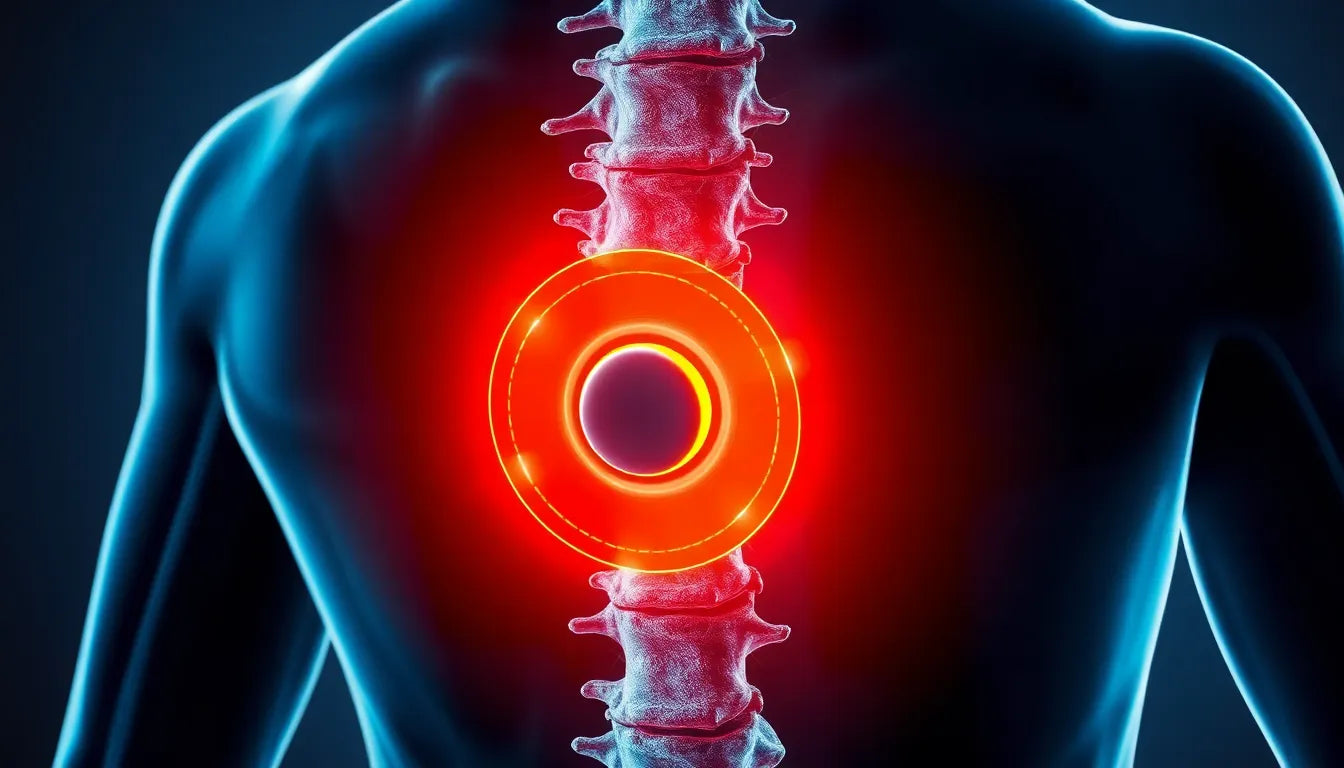Understanding a herniated disc is crucial for anyone experiencing back pain or discomfort. This condition occurs when the soft center of a spinal disc pushes through a crack in the tougher exterior casing. Although it can occur in any part of the spine, it's most common in the lower back. The causes of a herniated disc are varied, ranging from lifting heavy objects improperly to age-related wear and tear. Symptoms often include pain, numbness, or weakness in an arm or leg, depending on the location of the herniated disc.
Herniated discs are surprisingly common, affecting a significant portion of the population. They can have a profound impact on daily life, making even simple tasks like walking or sitting a challenge. For many, the pain and discomfort can be debilitating, leading to a search for effective treatment options. While surgical interventions are available, they may not be necessary for everyone. This is where natural healing methods come into play, offering a less invasive alternative for managing herniated discs.
The appeal of natural remedies
In recent years, there has been a growing interest in non-invasive, natural approaches to managing herniated discs. This trend is driven by the desire to avoid the risks and recovery time associated with surgery. Natural remedies offer a range of benefits, including fewer side effects and the potential for holistic health improvements. These methods focus on supporting the body's natural healing processes, rather than simply masking symptoms.
Natural healing methods can empower individuals to take control of their recovery journey. By exploring evidence-based solutions, you can address the root causes of your discomfort and work towards long-term relief. From gentle exercise and physical therapy to dietary changes and alternative therapies, there are numerous ways to support your body's healing process naturally. In this blog post, we will delve into these methods, providing you with the tools and knowledge to soothe your herniated disc without the need for surgery.
Gentle exercise and physical therapy for herniated disc recovery
Incorporating gentle exercise into your routine is a powerful way to promote healing from a herniated disc. Low-impact activities such as walking, swimming, and yoga are particularly beneficial as they help improve blood circulation, which is crucial for delivering nutrients to the injured area and supporting tissue regeneration. These exercises also strengthen the muscles surrounding the spine, providing better support and reducing the risk of further injury.
Physical therapy plays a vital role in recovery by offering tailored exercises that enhance spinal health and flexibility. A physical therapist can guide you through a personalized program that focuses on maintaining proper posture and gradually increasing your activity levels. This approach not only aids in healing but also helps prevent future issues by teaching you how to move safely and efficiently.
Harnessing the power of heat and cold therapy
Heat and cold therapy are simple yet effective methods for managing pain and inflammation associated with a herniated disc. Applying heat, such as through a heating pad or warm compress, can help relax tense muscles and improve circulation, which is essential for healing. On the other hand, cold therapy, like ice packs, is effective in reducing inflammation and numbing acute pain.
For optimal relief, consider alternating between heat and cold. Start with cold therapy to reduce swelling and pain, then switch to heat to soothe and relax the muscles. This combination can provide comprehensive pain management and enhance your comfort throughout the day.
Massage and myofascial release techniques
Massage therapy offers significant benefits for those suffering from a herniated disc. It helps alleviate muscle tension, target trigger points, and promote relaxation, all of which can contribute to pain relief. While professional massage is highly effective, self-massage techniques can also be beneficial. Using a foam roller or massage ball, you can gently work on the affected areas at home.
Myofascial release, a technique that focuses on releasing tightness in the connective tissues, can further support muscle relaxation and pain relief. Incorporating these practices into your routine can enhance your recovery and provide ongoing comfort.
Hydrotherapy and the benefits of Epsom salt baths
Hydrotherapy, including the use of warm water baths, is known for its anti-inflammatory effects and ability to ease discomfort. Adding Epsom salts to your bath can enhance these benefits. Epsom salts contain magnesium, which is absorbed through the skin and can help reduce inflammation and muscle tension.
To prepare a therapeutic bath, fill your tub with warm water and add about two cups of Epsom salts. Soak for 15-20 minutes, allowing the warmth and magnesium to work their magic. This simple practice can be a relaxing and effective way to support your body's natural healing processes.
Supporting recovery through diet and supplements
Diet plays a critical role in the healing process of a herniated disc. An anti-inflammatory diet rich in omega-3 fatty acids, turmeric, and ginger can help reduce inflammation and support overall health. Foods like fatty fish, leafy greens, and nuts are excellent choices to incorporate into your meals.
Supplements can also aid in recovery. Collagen, MSM, glucosamine, and curcumin are known for their ability to support tissue repair and reduce inflammation. Consider consulting with a healthcare professional to determine which supplements are best suited for your needs.
By integrating these natural methods into your lifestyle, you can take proactive steps towards soothing your herniated disc and improving your overall well-being. These strategies not only address the symptoms but also empower you to support your body's innate healing abilities.
Exploring alternative therapies for herniated disc relief
When seeking natural ways to soothe a herniated disc, alternative therapies can offer promising avenues for pain management and overall well-being. Acupuncture and acupressure are two such therapies that have been used for centuries to alleviate pain by stimulating specific points on the body. These methods can help reduce discomfort and promote relaxation, although results may vary from person to person.
Inversion therapy is another option that involves hanging upside down or at an angle to relieve spinal pressure. This practice can provide temporary relief by decompressing the spine, but it is important to note that it does not heal the disc itself. When considering these therapies, it is crucial to consult with professionals to ensure safety and effectiveness.
Lifestyle adjustments for spinal health
Adopting certain lifestyle changes can significantly impact the health of your spine and aid in the recovery from a herniated disc. Maintaining a healthy weight is essential, as excess weight can place additional stress on the spine. Engaging in regular cardiovascular exercise can help manage weight and improve overall fitness, which supports spinal health.
Stress reduction is another critical component, as stress can exacerbate pain and tension. Practices such as meditation, deep breathing exercises, and mindfulness can help manage stress levels. Additionally, ensuring adequate sleep is vital for recovery, as it allows the body to repair and regenerate tissues.
Integrating natural methods with professional guidance
While natural remedies can offer significant relief, they should not be viewed as a guaranteed cure for a herniated disc. It is important to seek professional evaluation if you experience prolonged pain or neurological symptoms. A healthcare provider can offer a comprehensive assessment and recommend a balanced approach that incorporates natural methods alongside medical treatments.
By working with professionals, you can create a personalized plan that aligns with your specific needs and recovery goals. This collaborative approach ensures that you are addressing all aspects of your health and maximizing your potential for healing.
Frequently Asked Questions
What is the fastest way to heal a herniated disc naturally?
The fastest way to heal a herniated disc naturally involves a combination of gentle exercise, a nutritious anti-inflammatory diet, and therapies such as massage and acupuncture. Consistency and patience are key, as these methods work together to support the body's healing processes.
Can a herniated disc heal on its own?
Yes, a herniated disc can heal on its own over time. The body has natural healing mechanisms that can reduce inflammation and repair damaged tissue. Factors such as age, overall health, and adherence to a healthy lifestyle can influence the healing process.
Are there any risks associated with natural treatments?
While natural treatments are generally safe, there are potential risks if not done correctly. Overexertion during exercise or improper use of therapies like inversion can lead to further injury. It is crucial to consult with healthcare professionals to ensure that natural treatments are appropriate for your condition.
How long does it take to see improvements with natural methods?
The time it takes to see improvements can vary depending on the severity of the herniated disc and the individual's overall health. Some people may notice relief within a few weeks, while others may require several months of consistent effort. Patience and adherence to recommended practices are essential for optimal results.
Can lifestyle changes prevent future herniated discs?
Yes, lifestyle changes can play a significant role in preventing future herniated discs. Maintaining a healthy weight, engaging in regular exercise, practicing good posture, and managing stress are all important factors in preserving spinal health and reducing the risk of recurrence.
Sources
- HealthPartners. (n.d.). "Natural Remedies for Herniated Disc."
- MoreGoodDays. (n.d.). "Lifestyle Tips for Managing Herniated Discs."
- Spine-Health. (n.d.). "Natural Remedies for Herniated Disc."
- Cleveland Clinic. (n.d.). "Herniated Disc Overview."
- PremiaSpine Blog. (n.d.). "Herniated Disc Recovery Story."
- Dr. Kevin Pauza. (n.d.). "Herniated Disc Treatment Options."
- Alternative Disc Therapy. (n.d.). "Natural vs. Unproven Therapies for Herniated Disc."


















